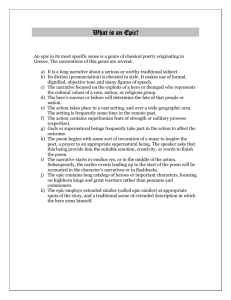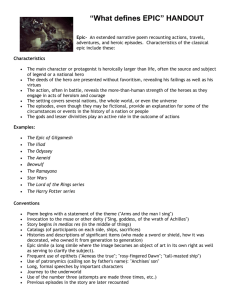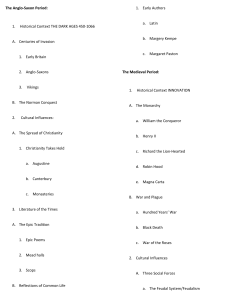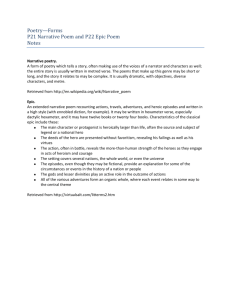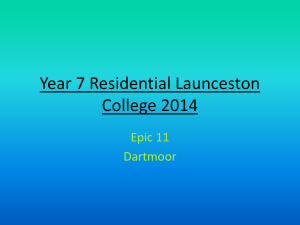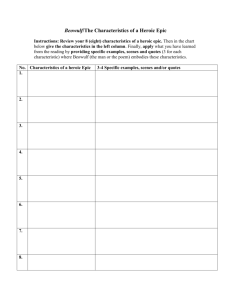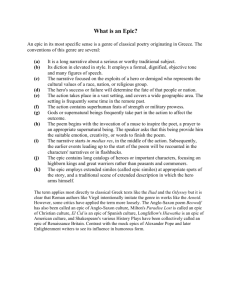IN SEARCH OF A MODERN EPIC: ON THE GENERIC STATUS OF
advertisement
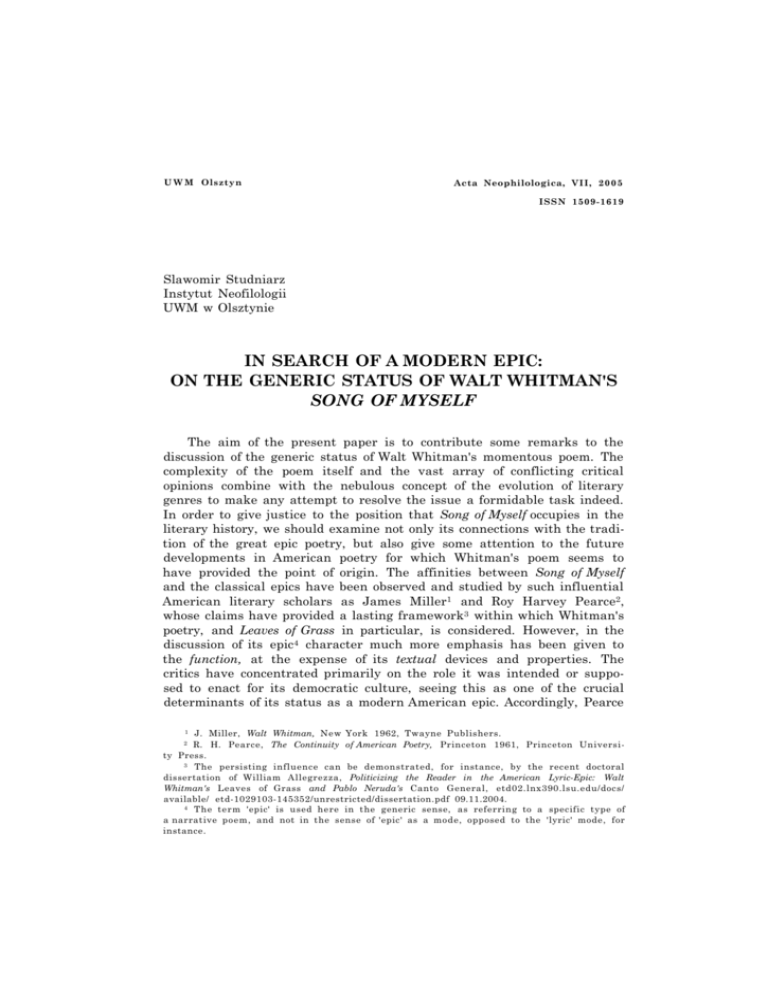
U W M Olsztyn Acta Neophilologica, VII, 2 0 0 5 ISSN 1509-1619 Slawomir Studniarz Instytut Neofilologii UWM w Olsztynie IN SEARCH OF A MODERN EPIC: ON THE GENERIC STATUS OF WALT WHITMAN'S SONG OF MYSELF The aim of the present paper is to contribute some remarks to the discussion of the generic status of Walt Whitman's momentous poem. The complexity of the poem itself and the vast array of conflicting critical opinions combine with the nebulous concept of the evolution of literary genres to make any attempt to resolve the issue a formidable task indeed. In order to give justice to the position that Song of Myself occupies in the literary history, we should examine not only its connections with the tradition of the great epic poetry, but also give some attention to the future developments in American poetry for which Whitman's poem seems to have provided the point of origin. The affinities between Song of Myself and the classical epics have been observed and studied by such influential American literary scholars as James Miller1 and Roy Harvey Pearce2, whose claims have provided a lasting framework3 within which Whitman's poetry, and Leaves of Grass in particular, is considered. However, in the discussion of its epic4 character much more emphasis has been given to the function, at the expense of its textual devices and properties. The critics have concentrated primarily on the role it was intended or supposed to enact for its democratic culture, seeing this as one of the crucial determinants of its status as a modern American epic. Accordingly, Pearce J. Miller, Walt Whitman, New York 1962, Twayne Publishers. R. H. Pearce, The Continuity of American Poetry, Princeton 1961, Princeton University Press. 3 The persisting influence can be demonstrated, for instance, by the recent doctoral dissertation of William Allegrezza, Politicizing the Reader in the American Lyric-Epic: Walt Whitman's Leaves of Grass and Pablo Neruda's Canto General, etd02.lnx390.lsu.edu/docs/ available/ etd-1029103-145352/unrestricted/dissertation.pdf 09.11.2004. 4 The term 'epic' is used here in the generic sense, as referring to a specific type of a narrative poem, and not in the sense of 'epic' as a mode, opposed to the 'lyric' mode, for instance. 1 2 64 Slawomir Studniarz argues that Whitman wrote Song of Myself '[a]cting out of his exquisite feeling for the deep and terrible need of his culture to find an adequate poetic image of its very being"5. Similarly, Miller stresses the role that Leaves of Grass is supposed to perform for the American society, stating that it is 'the modern, New World epic to serve America, as the great epics of the past served their countries'6. It is worth pointing out a strange inconsistency in the critical perceptions, since the status of an epic is attributed either to Leaves of Grass in its entirety, or to its single element, Song of Myself Miller, and Allegrezza after him, opt for viewing the whole collection as the foundation of the epic in the United States, and the particular poems as representing 'phases' or lines in 'a narrative thread'7. On the other hand, Pearce, disagreeing with Miller, regards Song of Myself alone as 'the clearest, surest, most self-contained and complete [...] product of Whitman's desire to create an American epic'8. A similar hesitation can be detected in acknowledging the status of Song of Myself and Leaves of Grass as epics. Pearce calls Song of Myself 'the full and complete surrogate [emphasis added] for the traditional epic'9, and is in fact reluctant to admit its epic status, saying that it is 'not an epic, but an American equivalent of an epic'10. From a different perspective, focusing on the temporal dimension and the role of the reader, Allegrezza states that '[i]n the lyric-epic, the lyric and epic elements are combined, and Leaves of Grass, following James Miller's terminology, is a lyric-epic. The text is a patchwork of lyrics that is pieced together to create an epic' 11 . By the lyric quality Allegrezza means here the predominant present tense, the continuing 'now' of the poem, into which the reader as its addressee is drawn: 'The lyric moment allows W h i t m a n to speak more directly to the reader from the position of an " I " than is possible in traditional epics' 12 . However, as we intend to show, the rapport that the poetic persona establishes with the addressee in the poem stems from the original epic convention, that of oral delivery, the recital of an epic in front of an 5 6 7 8 9 10 11 12 R. H. Pearce, op. cit., p.73. J. Miller, op. cit., p. 77. See: J. Miller, op. cit., p. 78-79, W. Allegrezza, op. cit., p. 16 R. H. Pearce, op. cit., p. 73. Ibidem, p. 73. Ibidem, p. 83. W. Allegrezza, op. cit., p. 15. Ibidem, p. 72. In Search of a Modern Epic: on the Generic Status of Walt Whitman's. 65 audience, whereas the essence of the lyric is its being a confession of an solitary speaker. According to the famous formulation of John Stuart Mill discussed by M.H. Abrams, 'poetry [lyrical] is feeling, confessing itself to itself in moments of solitude. ...All poetry is of the nature of soliloquy', and as Abrams puts it, '[in a lyric] the poet's audience is reduced to a single member, consisting of the poet himself 13 . The ensuing discussion is meant as a corrective supplement, an attempt to clarify the doubts surrounding the generic status of Song of Myself, by focusing first of all on its structural affinities with the traditional epic, represented in the Western world by the Iliad, the Odyssey, the Aeneid, Divine Comedy and Paradise Lost. However, the very juxtaposition of Song of Myself with the works separated from it by centuries or even millennia, produced in so different historical and cultural epochs ancient Greece and Rome, Italy of the late Middle Ages, and the Protestant England - raises serious historical and methodological issues. Besides controversial pairing of antiquity with modernity, strict feudal or royal hierarchy with democracy, it begs the question of their generic continuity in the course of the literary evolution, that is, the question if there are any common principles underlying such discrete and temporally distant poetic utterances as the Iliad and Song of Myself. In order to prove that there are, we must first examine the very concept of a genre. First of all, a genre cannot be identified with a set of literary texts that are its manifestations. A genre is prior to its individual realizations. As Glowinski observes, it is 'a set of directives. Directives prescribing certain practices followed in constructing a literary text (and, subsequently in its reception), practices that are sanctioned by society or at least striving to gain such a sanction. [...] In some historical situations these directives may be explicitly stated (as principles of decorum, for instance), in others they may operate latently and later are subject to reconstruction' 14 . If the directives are explicit and the features of a genre easily recognized, then the literary production is accompanied by the proper genological awareness. In the case of the traditional epic poem one need not doubt that it has always been recognized as such, with the Odyssey or the Aeneid 13 M. H. Abrams, Orientation of Critical Theories, in: Twentieth Century Literary Theory: An Introductory Anthology, ed. by V. Lambropoulos and D. N. Miller, Albany 1987, State University of New York Press, p. 24. 14 M. Glowinski, Gatunki literackie, in: Dzielo wobec odbiorcy. Szkice z komunikacji literackiej, Krakow 1998, Universitas, p. 50. (Quotations from Glowinski and later from Opacki and Morawski are given in my own translation from Polish). 66 Slawomir Studniarz as obvious models to rely on. However, a genre is a complex construct, as it comprises what Glowinski goes on to call respectively its 'domain of necessity' and 'sphere of possibilities': 'By "domain of necessity" we mean everything that determines the essence of a genre, that differentiates it from other genres, makes it recognizable as such in the process of literary communication.' But it would be a mistake to try to define a genre by its essence: 'no genre can be reduced to what constitutes its domain of necessity, hence it cannot be defined only by its invariant elements. It has at its disposal a vast sphere of possibilities - manifold, variable, sometimes contradictory and - at a given historical stage of the functioning of the genre - mutually exclusive' 15 . The interplay of and changing proportions between the necessary and possible elements, 'invariants and variable factors' within a genre, result in its dynamic, historically conditioned nature. Opacki goes as far as to claim that 'A literary genre, in the course of its evolution, m a y produce different, entirely dissimilar generic "patterns" (or "variants"). Such patterns (variants), however, do not represent separate genres: their complete contradistinction, contrast would only come about as a result of isolating both patterns from the evolutionary chain and placing them side by side' 16 . A genre, therefore, is understood as a chain of 'structural configurations', it is continuous with its unbroken evolutionary sequence, but within this continuity changeable, modified by successive literary trends. By isolating the particular historical variants from the evolutionary chain we run the risk of losing sight of their common identity, because such structural configurations, as Andrzej Zgorzelski observes, 'often manifest completely different features and their systemic nature could only be exposed by a study of the whole evolutionary sequence'17. 'Systemic', because a genre is a diachronic system, which is observed from a historical perspective and underlies or generates a specific set of texts as its concrete manifestations at a given stage of its evolution. The methodological positions of Opacki and Zgorzelski on the one hand, and Glowinski on the other seem to be mutually inadmissible, since the first two scholars preclude the very idea of the domain of necessity, allowing the complete exchange of structural Ibidem, p. 52 I. Opacki, Krzyzowanie siq postaci gatunkowych jako wyznacznik ewolucji poezji, w:, Problemy teorii literatury, ed. by H. Markiewicz, seria 1, Wroclawl987, Ossolineum, p. 142. 17 A. Zgorzelski, Is Science Fiction a Genre of Fantastic Literature?, 'Science-Fiction Studies', 19, Volume 6, Part 3, November 1979, (http://www.depauw.edu/sfs/backissues/19/ zgorzelskil9art.asp) , 2004.05.02. 15 16 In Search of a Modern Epic: on the Generic Status of Walt Whitman's. 67 features in the course of the evolution of a literary genre. However, it is reasonable to assume that evolutionary processes for different genres may follow different courses, and even show occasional reversions to distant historical variants through which a literary genre seeks to renew itself. The genological framework presented above seems not only reasonable, but also productive, because its adoption allows more flexibility in the treatment of genres and opens up new, broader perspectives in the study of particular texts, bringing to light hidden connections and acknowledging previously unseen influences. The first logical step in discussing Song of Myself as a modern epic should involve a tentative definition of the epic poem or rather a description of its historical variants. We will try to establish their domain of necessity, fundamental features exhibited by the classic epics, while pointing out new developments that actualize their sphere of possibilities. The classic epic is roughly defined as a long narrative poem that records the adventures of a hero whose exploits are crucial to the history of a nation18, whereas the entry in Encyclopaedia Britannica19 enumerates the following elements of the epic convention: 'the centrality of a hero, sometimes semi divine, of military, national, or religious importance; an extensive, perhaps even cosmic, geographical setting; heroic battle; extended and often exotic journeying; and the involvement of supernatural beings in the action.' Frye notices that the epic is characterized by 'the encyclopaedic range of its themes', its scope is immense, 'from heaven to underworld', and it incorporates 'an enormous mass of traditional knowledge'20. The epic originated as a poem recited by a poet or bard in front of an audience; it is primarily an oral genre. Scholars distinguish the so-called Primary Epics and Secondary Epics. The former means the oral narrative poetry of warrior societies ( Homer, Beowulf, the Chanson de Roland, the Niebelungenlied) and the latter - 'written heroic narratives (Virgil, Dante, Milton) by authors of later, more civilized nations who wished to transform the old oral conventions into imperial and Christian contexts'21. An epic poet was a public figure, taking a central place in a community, and performing for it an important service by reviving the tradition, recreating the heroic age, uniting the nation's present with the past22. The initially actual connection between a speaking poet and listeners, in the 18 R. Di Yanni, Literature: Reading Poetry, Fiction, Drama, and the Essay, New York 1990, McGraw-Hill, p. 423. 19 .Epic", Britannica CD. Version 97. Encyclopaedia Britannica, Inc., 1997. N. Frye, Anatomy of Criticism, Princeton 1973, Princeton University Press, p. 318. 31 J. McWilliams, The Epic in the Nineteenth Century, in: The Columbia History of American Poetry, ed. by J. Parini, New York 1993, Columbia University Press, p. 34. See: Z. Kubiak, Wstęp do: Iliada, Warszawa 1990, PIW. 68 Slawomir Studniarz course of the evolution of the epic, became only assumed, implied or theoretical. However, the convention of oral delivery as 'singing' had been preserved as well as the invocation of the Muse in the opening lines. The poet figures in the Iliad, the Odyssey, the Aeneid, and the Paradise Lost refer to their craft as 'singing", and turn to the Muse for inspiration. And when the Muse sings through them, they are no longer important as persons, they rise above their individuality and subjectivity; they become media or channels. The poetic persona appears especially humble and selfeffacing in the opening of the Paradise Lost, where the invocation of the Muse is inordinately extended and the Muse is identified with the Holy Spirit that has spoken through the biblical prophets. The theme of the classic epic is almost obligatorily announced in the opening lines, and the action starts in medias res. Beginning with the Odyssey, the song of a long, complicated and perilous voyage home, the motif of a journey or a quest seems to occupy a more prominent position than war or a battle, reaching its culmination in the Divine Comedy, with its composition closely following the pattern of a spiritual journey through Hell, Purgatory, and Heaven. Morawski, in his Introduction to the Polish translation of Dante's masterpiece, emphasizes striking similarities between Odysseus and the poet figure in the Divine Comedy, as the latter 'sets himself a goal difficult to accomplish. His path bristles with dangers. Both [Odysseus and Dante's poetic persona] are driven by the desire to find the truth. Odysseus has crossed the boundaries of the known world, Dante [the poet figure] has entered the gate of Hell, so as through Purgatory and Paradise to reach the source of ultimate happiness and good, and finally face God' 23 . Although rooted in the tradition of the classic epic, Divine Comedy represents a new historical variant. It encompasses the whole Christian universe, and it is addressed to all Christian believers. It becomes the universal epic of Christendom, no longer restricted to any particular nation. Furthermore, unlike, for instance, the Aeneid, where the poet figure praises the exploits of the mythic founder of Rome, Dante's poet presents himself as a hero, and his own adventures in the realms inaccessible to ordinary mortals. He understands his quest differently, though. He views himself as 'an apostle or a guide, a leader of the humanity gone astray', and his poetic mission involves 'pointing out all the miseries of the contemporary world and bringing to light their direct and indirect causes', spiritual renewal and paving the way for the mysterious "Veltro", the Savior24. 23 24 K. Morawski, Wstęp do: Boska komedia, Wroclaw 1986, Ossolineum, p. LX. Ibidem, pp. LX-LXII. In Search of a Modern Epic: on the Generic Status of Walt Whitman's. 69 The case of the Divine Comedy with respect to its position in the evolutionary chain of epic poems is quite interesting. Although highly acclaimed, it did not influence the subsequent variants, because as E.M.W. Tillyard notes, its author 'created no school', nor 'did Dante affect the course of the later English epic'25. The great English epic Paradise Lost represents a reversion to the earlier model, that of the heroic poem established by Virgil, bypassing completely Dante's poem. However, the Divine Comedy, although, or perhaps, because it had departed considerably from the earlier heroic epic poem, exerted a considerable influence on Romantic poets attempting to create large-scale works comparable to the traditional epics, proposing poet figures as modern heroes. Among these, Song of Myself and The Prelude by William Wordsworth constitute two striking responses to the epic tradition;in addition, they display a host of common characteristics and as such invite a close comparative study. Because of the limited scope of the present article we will discuss the affinities between the two poems only briefly, first, however, let us examine the epic character of Song of Myself In the ensuing discussion we will focus on the traits that the American Romantic poem shares with its predecessors as well as on its points of radical departure from the previous historical variants. The opening lines of the poem, in keeping with the classic epic convention of an initial theme statement, clearly announce its subject matter: 'I celebrate myself, and sing myself, And what I assume you shall assume, For every atom belonging to me as good belongs to you.' 2 6 Additionally, by the very phrasing, they also serve as a means of generic identification. They unequivocally recall the beginning of the Aeneid: 'I sing of warfare and a man at war'. The adopted strategy aims at having the implied reader recognize the tradition to which Song of Myself refers, suggesting its literary affinities. However, as much as the classic pattern is evoked here, it is also subverted, because the aim of the poem is not to praise a nation's hero, but to present and celebrate the poetic self. The strategy of simultaneous evocation and subversion of the epic tradition seems to be the dominant tendency in the poem. It is also evidenced by the prosody. The first line embodies perfect iambic pentameter (five two-syllable rising feet, with stress on the second syllable), the meter of ;heroic poetry - used by the English translator of the Aeneid and by Milton E.M.W. Tillyard, Dante, in: Perspectives on Epic, ed. by F.H. Candelaria, Boston , Allyn and Bacon, p. 51. 26 All the quotations are based on The Norton Anthology of American Literature, New 1993, Norton & Company, vol. I. 25 70 Slawomir Studniarz in Paradise Lost - which is totally disrupted in the second line, with it jarring combination of iamb (rising foot) and trochee (falling foot) in the middle of the line, while the basic four-measure rhythm (four main stresses in a l repeated configurations of iambic and anapestic feet. The second line - 'And what I assume you shall assume' - expresses the speaker's great confidence in his artistic power, in his near-magical skills of transformation by means of his poetry. He is convinced that by presenting his poetic self he will trigger the process of change in th( addressee. But more importantly, the opening lines of the poem establish £ close personal relationship between the speaker and 'you' to whom he addresses his words. Regarding the status of 'you', the object of the ad dress in a fictional or a poetic text, David Herman27 distinguishes five major functional types of textual 'you', of which his fourth category, what he calls the 'apostrophic' you, seems relevant here. According to him 'apostrophe' or 'actualized address' entails address that exceeds the frame (01 ontological threshold) of a fiction to reach the audience, thus constituting 'vertical' address'. In contrast with 'fictionalized' or 'horizontal' address, which is directed to an intratextual addressee, 'apostrophic' address operates vertically, reaching beyond the text, to an extratextual addressee, the actual reader. Such a direct extratextual address in Song of Myself may be construed as an adaptation of the convention of the epic, since it represents an attempt to recreate the initially actual relationship between a speaking poet and a listening audience. The speaker in the poem is, of course, Whitman's poetic persona, his 'mask', but very much in the epic tradition, the poetic persona is close to the poet, it is his porte-parole. The speaker in Song of Myself bears some biographical features of his creator; he is of the same ancestry, and of the same age as Whitman was at the time of the composition of the poem - 'I, now thirty seven years old in perfect health begin' - and in the section 24, is even named 'Walt Whitman, a cosmos, of Manhattan the son'. The reference to the speaker's age in the opening section is reminiscent of Divine Comedy, where Dante's poet similarly draws attention to his age and his personal situation: 'Midway upon the journey of our life I found myself within a forest dark, For the straightforward pathway had been lost. 2 8 27 D. Herman, Textual You and Double Deixis in Edna O'Brien's A Pagan Place, (http://www.cogweb.ucla.edu/Abstracts/Herman_94.html). 2004.09.02. 2 8 (http://www.readprint.com/chapter-158/Dante-Alighieri), 06.11.2004. In Search of a Modern Epic: on the Generic Status of Walt Whitman's. 71 The strategy of evocation and subversion implemented in the opening line of the poem is also visible in the treatment of the invocation of the Muse, other important convention of the classic epic. Unlike the established pattern, where the assistance of the Muse in a poetic undertaking at hand is sought very early on, in Song of Myself the equivalent of the classical invoca| action does not take place until section 5. The poetic genius is there identified with the speaker's soul, but it is for him more than just a source of inspiration, he cherishes its very presence as a beloved companion: 'Loaf with me on the grass, loose the stop from your throat, Not words, not music or rhyme I want, not custom or lecture, not even the best, Only the lull I like, the hum of your valved voice.' Whitman's poet then goes on to recall the event from the past, the mystical union of himself as an ordinary human being and the soul, his Muse, couched in terms of rapturous love-making, from which: ' Swiftly arose and spread around me the peace and knowledge that pass all the argument of the earth [...] And I know that the spirit of God is the brother of my own, And that all the men ever born are also my brothers, and the women my sisters and lovers, And that a kelson of creation is love [...]'. Thus, the origin of his creative energy and the source of his poetic vision are traced back to this crucial formative experience. Within the presented framework, his initial declaration in the fourth line - 'I loaf and invite my soul' - cryptic at first, through retrograde process acquires the sense and weight of the proper invocation. The poetic persona in Song of Myself in his capacities closely parallels Dante's poet. Just as his predecessor, he traverses the whole scale of human experience and even reaches beyond the limits of ordinary mortality. The hints at the spiritual journey of his soul are found in section 33: 'I visit the orchards of spheres, ... I fly those flights of a fluid and swallowing soul, My course runs below the soundings of plummets. I help myself to material and immaterial [...]'. In his poetic experience he encompasses the underworld and the divine realm alike: The pleasures of heaven are with men and the pains of hell are with me, . The first I graft and increase upon myself, the latter I translate into a new tongue.' 'Wy^rrJo- c w v ^ * p J> 72 Slawomir Studniarz Similarly to the poet figure in Divine Comedy, he undertakes a messianic mission, in which he models himself on Christ. In section 19 he offers hi poetry as a feast to which he invites the humble, the downtrodden, a misfits and outcasts: 'This, the meal equally set for the wicked just the same as the righteous [...] I will not have a single person slighted or left away.' In his Christ-like compassion, he identifies himself with all of the suffering humanity, he gives his poetic voice to those who have been denied the right to speak and be heard. He becomes their spokesman, their channel their medium: 'Through me many long dumb voices, Voices of the interminable generations of prisoners and slaves, Voices of the diseas'd and despairing [...] Through me forbidden voices, Voices of sexes and lusts, voices veil'd and I remove the veil, Voices indecent by me clarified and transfigured.' However, the emphatic anaphoric repetition of the phrase 'through mi which begins in a preceding line - Through me the afflatus surging and surging, through me the current and index' - serves as an intertextual signal referring to the inscription on the gate to Hell in Divine Comedy: 'Through me the way is to the city dolent; Through me the way is to eternal dole; Through me the way among the people lost.' The role that the poet figure in Song of Myself envisages for himself, as liberator, 'rectifier' and 'articulator' of hidden human desires, seems to 1 in direct opposition to the hopelessness, terror, and repression evoked 1 the Gate of Hell. Whitman's poetic persona transcends the limits of an ordinary hum£ being. He achieves a unique and supreme position in the whole creation both as the pinnacle of the long ongoing process of evolution, cosmic and human, and the directing force of its future course. Much like Dante's poet ascending to the Paradise, the speaker in Song of Myself rises above the physical universe, and in his ecstatic vision embraces all time: 'My feet strike an apex of the apices of the stairs, On every step bunches of ages, and larger bunches between the steps, All below duly travel'd, and still I mount and mount'. In Search of a Modern Epic: on the Generic Status of Walt Whitman's. 73 The poetic self reveals itself as eternal and immortal, it precedes the creation of the universe, as from his cosmic perspective Whitman's poet perceives 'the huge first Nothing', and knows 'he was even there'. In parallel to the unfolding of the multi-faceted poetic persona, its relationship with the reader established at the outset also undergoes development and further modification throughout the poem. The presentation of Whitman's poetic persona, its nature, attributes, attitudes, and perceptions serves a worthy cause of lifting the reader's self from its present unregenerate and ignorant state. In section 2 the speaker pleads the reader's attention and invites him to dwell in his poetic world. He promises to reveal to him 'the origin of all poems', which means that the reader is going to participate in the poetic experience encoded in the text. By becoming party to the poetic recreation of the birth, development and fulfillment of Whitman's poet, the reader is assured: 'You shall no longer take things at second or third hand, nor look through the eyes of the dead, nor feed on the specters in books.' The quest for one's true being, for one's inner self is metaphorically described as a walking-tour, a glob-trotting expedition to unknown places, however, the task can only be accomplished by the reader himself, the speaker just points the way, opens the gate, and encourages him to take the first step. The speaker performs a special rite on him as a newborn baby, himself slipping simultaneously into the roles of a midwife and a fairy godmother: 'Long enough have you dream'd contemptible dreams, Now I wash the gum from your eyes, You must habit yourself to the dazzle of the light of every moment of your life. Long have you timidly waded holding a plank by the shore, Now I will you to be a bold swimmer, To jump off in the midst of the sea, rise again, nod to me, shout, and laughingly dash with your hair.' The transforming power of poetry finds here its highest application. It propels the process of the reader's awakening to his true nature, coming to himself and to infinite possibilities offered by existence. As Karl Kroeber points out, 'faith in the power of poetry to expre kind of truth is the necessary condition of all Romantic attempts at epic'29. In Whitman's poem, poetry is not only the tool of cognition and communication, but it is also vested with the recuperative and transformative 29 K. Kroeber, Wordsworth: The Personal Epic, in: Perspectives on Epic, p. 97. 74 Slawomir Studniarz power. In Song of Myself, the individual reader, the private person is both the beneficiary of the poetic experience and the witness of the self-presentation of the poetic persona and the projected transformation of the addressee, can be understood as the substitute for plot on which the traditional epic poems were founded. Obviously, Song of Myself does not possess a narrative quality, which is generally thought to be one of the essential epic features. However, it proposes the self-presentation of the poet-hero and the projected transformation of the addressee as equivalent to heroic actions of the classical epic. In its rejection of the traditional principles of epic narrative, Song of Myself closely parallels Wordsworth's The Prelude. Kroeber views Wordsworth's poem as one of the earliest Romantic poems 'which, whether or not itself a kind of epic, has usurped the function of traditional epic'30. According to that critic, The Prelude departs in many ways from the classical epic, yet it is precisely 'these reversals of conventional epic standards [...] that command for The Prelude the title of epic'31. Many scholars emphasize the indebtedness, although never acknowledged by Whitman, of Song of Myself to The Prelude, claiming that 'it is the fulfillment of Wordsworth's autobiographical epic', Whitman's own version of The Prelude, 'an autobiographical poem with epic scope'32. Kroeber proposes to view the poet figure in The Prelude as 'the prototype of the contemporary hero: the man who fights against his culture', and suggests as its subject the power of imagination at the service of conveying 'the whole truth about the place and function of the individual in both the macrocosm of Nature and the microcosm of his society'33. Undoubtedly, these remarks can also be applied to Song of Myself, the only difference being that the poet figure in Whitman's poem not so much opposes his culture, but seeks to transform it by attempting to effect an inner change in individual readers. So far we have discussed the textual properties and strategies of Song of Myself derived from the traditional epic, emphasizing especially its affinities with Divine Comedy, and briefly commented on its connections with The Prelude. However, in order to give a full account of its position in the evolutionary sequence of poetic works deriving from the classical epic, we must include its relation to its American predecessors, attempted epics of the late eighteenth and early nineteenth century, as well as its possible influence on the Modernist 'long poem', represented, for instance by The Ibidem, p. 101. Ibidem, p. 101. 32 See: J.D. Moores, Wedded in Natural Matrimony: Cosmic Love in Wordsworth and Whitman, Renascence, Spring 2004, (http://www.findarticles.eom/p/artides/mi_qa3777/ is_200404/ai_n9392581), April 2005. 33 K. Kroeber, op. cit., p. 100. 30 31 In Search of a Modern Epic: on the Generic Status of Walt Whitman's. 75 Waste Land, Paterson or the Cantos. As John McWilliams observes, order to trace the course of epic poetry in America, 'we must attend to the kinds of generic transformations authors wished to achieve'34. In conast to the many failed attempts at fashioning an American epic as a long heroic narrative in verse, The Columbiad by John Barlow, in its numerous departures from epic conventions, was the first work that demonstrated the awareness that the literary conventions by which epic was defined ad to be reshaped into viable contemporary literary forms or dropped ntirely35. Against the background of the American epics still visibly dependent on the classical models, Whitman's poem seems to push the boundaries of the epic so far that the very generic continuity comes into question. Bearing in mind its dominant strategy of the simultaneous evocation and subversion of the traditional epics, the specific character of Song of Myself would consist precisely in overtly and deliberately harking back to the epic tradition and at the same time radically redefining and remodeling it so as to establish a new poetic genre, replacing the epic but comparable to it in terms of scope and status. Hence Song of Myself would be the first link in the evolutionary chain, a precursor for the twentieth-century 'long poem', which as Lynn Keller observes, in combining elements of lyric and epic traditions along with the resources of various prose genres has provided a vehicle thanks to which poetry could reclaim for itself 'the range and significance it had ceded to the novel, a breadth of subject and discursive scope that would insure poetry's social relevance'36. Whether the Modernist long poems can be legitimately called 'epic' is highly debatable, and the wide use of the epithet to describe works so diverse as the Cantos, The Bridge, Paterson, The Dream Songs, The Maximum Poems, only adds to the generic confusion. The presented studies generally demonstrate the lack of clear criteria by which to decide if a new variant still belongs to the genre from which it has originated or, on the contrary, we witness the birth of a new genre. Zgorzelski suggests that one indication of the emergence of a new genre is the breach of historical continuity by 'the functional opposition of the variant to its historical roots, both in the alterations of its structure and in the general semantics'37. Following this helpful suggestion, we could conclude that the functional opposition of Song of Myself to its epic roots overrides its obvious, but rather superficial, derivations and thus establishes it as the first link in a new evolutionary sequence. 34 35 36 37 J. McWilliams, op. cit., p.36. See: Ibidem. L. Keller, The Twentieth-Century Long Poem, in: Columbia History of American Poetry., p. 534. A. Zgorzelski, op. cit. 76 Slawomir Studniarz Bibliography Allegrezza W., Politicizing the Reader in the American Lyric-Epic: Walt Whitman's Leaves of Grass and Pablo Neruda's Canto General, http: /etd02.Inx390.lsu.edu/docs/available/ etd-1029103-145352/unrestricted/dis sertation.pdf, 09.11.2004. Abrams M. H., Orientation of Critical Theories, in: Twentieth Century Literary Theory: An Introductory Anthology, ed. by V. Lambropoulos and D. N. Miller, Albany 1987, State University of New York Press, pp. 3-31. Di Yanni R., Literature: Reading Poetry, Fiction, Drama, and the Essay New York 1990, McGraw-Hill. Frye N., Anatomy of Criticism, Princeton 1973, Princeton University Press. Głowinski M., Gatunki literackie, in: Dzieło wobec odbiorcy. Szkice z komunikacji literackiej, Krakowl998, Universitas. Herman D., Textual You and Double Deixis in Edna O'Brien's A Pagan Place, http://www.cogweb.ucla.edu/Abstracts/Herman_94.html, 2004.09.02. Keller L., The Twentieth-Century Long Poem, in: The Columbia History of American Poetry, ed. by Jay Parini, New York 1993, Columbia University Press, pp. 534-563. Kroeber K., Wordsworth: the Personal Epic, in: Perspectives on Epic, ed. by F.H. Candelaria, Boston 1965, Allyn and Bacon, pp. 9 3 - 1 0 2 . Kubiak Z., Wstęp in: Iliada, Warszawa 1990, PIW. McWilliams J., The Epic in the Nineteenth Century, in: The Columbia History of American Poetry, pp. 33-63. Miller J., Walt Whitman, New York 1962, Twayne Publishers. Morawski K., Wstęp in: Boska Komedia, Wroclaw 1986, Ossolineum. Moores D.J., Wedded in Natural Matrimony: Cosmic Love in Wordsworth and Whitman, Renascence, Spring 2004, (http-//www.findarticlcs.com/p/articles/niLqa3777/is__200404/ai_n9392581), April 2005. Opacki I., Krzyżowanie się postaci gatunkowych jako wyznacznik ewolucji poezji, in: Problemy teorii literatury, seria 1, ed. by H. Markiewicz, Wroclaw 1987, Ossolineum. Pearce R. H., The Continuity of American Poetry, Princeton 1961, Princeton University Press. Tillyard E.M.W, Dante, in: Perspectives on Epic, pp. 5 1 - 5 2 . Zgorzelski A., Is Science Fiction a Genre of Fantastic Literature ?, http://www.depauw.edu/sfs/backissues/19/zgorzelskil9art.asp, 2004.05.02. Summary The aim of the article is to show the affinities of Song of Myself by Walt Whitman, an American Romantic poet, with the classical epic poem, on the basis of the theory of genre evolution propounded by such Polish scholars as Ireneusz Opacki, Michał Glowinski and Andrzej Zgorzelski. The first part discusses the status of Song of Myself as an epic poem as it is perceived by American literary historians. Then the extensive analysis of the poem's elements and devices is conducted, pointing to their roots in the classical epic. However, the dominant tendency in the poem is the strategy of simultaneous evocation and subversion of the epic tradition. As a result, Song of Myself emerges as an innovative poem, a precursor to the later Modernist 'long poems', and serves as the link between the classical epic poem and the extended poetic works or sequences of the twentieth century. In the final analysis, the role of Song of Myself is seen to consist in harking back to the tradition of classical epics on the one hand, and in its radical modification, and thus it seems to launch a new poetic genre.
